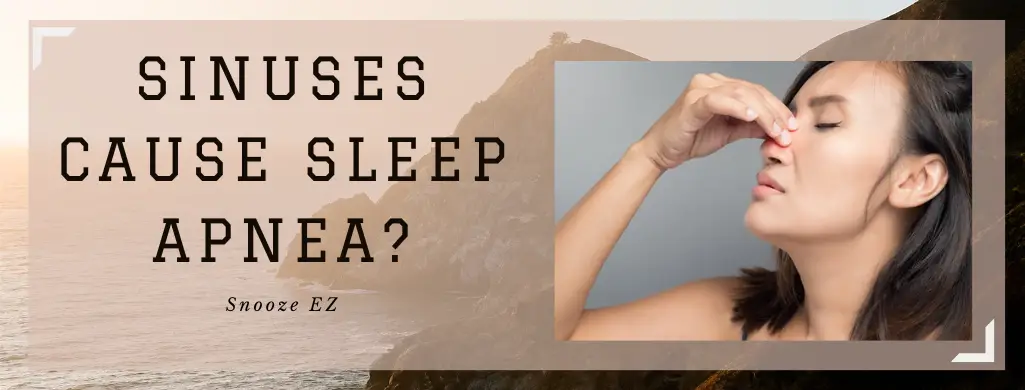Yes, sinuses can cause sleep apnea by blocking your airways.
Sleep apnea is a serious sleep disorder that affects how you breathe while sleeping. It causes pauses in breathing and can lead to other health problems if left untreated.
While many know that sleep apnea can be caused by several factors, including lifestyle and genetics, few are aware that sinuses can also be a cause of sleep apnea.
In this article, we will discuss the link between sinuses and sleep apnea, possible causes, how sinus problems can adversely affect your quality of sleep, as well as treatment options.
Anatomy of the Sinuses
The sinuses are a complex system found in the human body that can affect many aspects of our health, including how we sleep.
It is important to understand this anatomy in order to accurately diagnose and treat various conditions, such as sleep apnea.
The paranasal sinuses are air-filled cavities located within the bones around the nose and behind the eyes, cheeks, and forehead.
They connect to each other and also to the nasal cavity through small openings called ostia. These sinuses help filter and humidify air entering into the lungs while providing resonance for speech.
Additionally, they reduce skull weight by creating pockets of air inside it. Although it is not always clear whether or not these cavities can cause sleep apnea directly, they may be connected with other health issues that lead to this condition.
Can Sinuses Cause Sleep Apnea?
Yes, your sinuses can cause sleep apnea by blocking airways in the throat or upper airway, resulting in snoring and difficulty breathing during the night.
This is normally cause by congestion and inflammation called sinusitis. The blocked airways cause a sensation that could feel like suffocation or gasping for air as you wake from your sleep several times throughout the night.
Doctors at the Mayo Clinic have found a link between severe cases of sinusitis and higher instances of sleep apnea incidents due to blockages in airflow.
Relationship between Sinuses and Sleep Apnea
While there are many known causes for sleep apnea, including obesity and age, one factor that is often overlooked is the relationship between sinuses and sleep apnea.
Many studies have shown a link between chronic sinus inflammation and an increased risk of developing obstructive sleep apnea (OSA).
The connection between sinuses and OSA may be due to the fact that both involve obstruction in the airway.
The common trait shared by OSA and sinusitis is obstruction or narrowing of airways resulting from swelling or inflammation in the mucous membranes of the nose.
This swelling or inflammation causes the walls of the airways to swell and narrow. This is similar to what happens in the sinus cavity, where swelling due to infections leads to obstruction in the nasal passageways.
Symptoms of Sinusitis and Sleep Apnea
Sinusitis and sleep apnea are two of the most common respiratory conditions, yet they can be difficult to diagnose and distinguish from one another.
Both conditions involve blockages of the airways, leading to breathing difficulties. Symptoms of sinusitis may include facial pain or pressure, a stuffy nose, thick discolored discharge from the nose, fatigue, headaches and fever.
Sleep apnea is characterized by pauses in your breathing during sleep which can lead to excessive daytime sleepiness or fatigue.
Other symptoms may include loud snoring, choking/gasping during sleep, dry mouth upon waking and difficulty concentrating.
Knowing the signs and symptoms of both conditions is essential in order to seek prompt treatment if needed.
Treatment Options for Sinusitis and Sleep Apnea
Treating sinusitis often involves taking antibiotics or steroids to reduce inflammation and congestion, coupled with saline solutions or steam therapy to clear the nasal passages.
For more severe cases, doctors may recommend surgery to correct structural defects in the nose or sinuses that cause recurring symptoms.
As for sleep apnea, continuous positive airway pressure (CPAP) machines are commonly used to improve breathing, while dentists can provide oral appliances designed to keep airways open during sleep.
Impact of Chronic Sinusitis on Sleep Apnea
Chronic sinusitis is an inflammatory condition of the nasal passages, and research shows it can have an impact on the development of sleep apnea.
Studies have found that people with chronic sinusitis are at greater risk for developing sleep apnea due to blockage in the upper respiratory tract caused by inflammation or nasal polyps.
Additionally, post-nasal drip associated with chronic sinusitis can create additional blockage in the throat and lead to difficulty breathing during sleep.
Medication or surgery may be necessary to treat chronic sinusitis in extreme cases, which could help alleviate symptoms of sleep apnea as well.
Conclusion
Can sinuses cause sleep apnea? The answer is yes. Sinus congestion and inflammation can lead to sleep apnea in some cases, primarily because of how it affects the airway.
When the nasal passages become blocked due to inflamed sinuses, this can cause a narrowing of the airway and increased resistance when trying to breathe at night.
This may result in pauses in breathing or shallow breaths during sleep, which are signs of sleep apnea.
The findings are essential for diagnosing and treating those who suffer from sleep apnea as they demonstrate that disorders relating to the sinuses should be taken into consideration when examining patients with this condition.
Can sleeping on your stomach help with sleep apnea?
Can sleep apnea cause you to pee more at night?
Does sleep apnea prevent weight loss?


